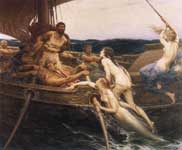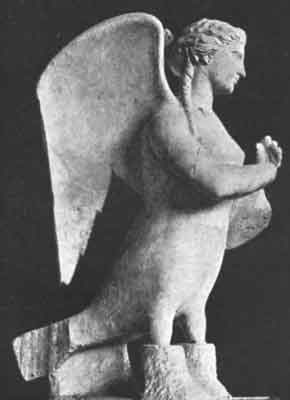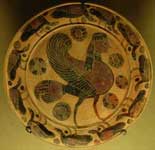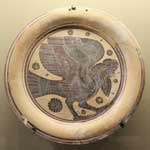.
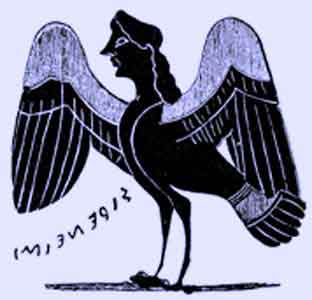
Siren Eimi, "I am a Siren", Vase painting

In Greek mythology, the Sirens or Seirenes (Greek Σειρῆνας) were Naiads (sea nymphs) who lived on an island called Sirenum scopuli which was surrounded by cliffs and rocks. Approaching sailors were drawn to them by their enchanting singing, causing them to sail on the cliffs and drown. They were considered the daughters of Achelous (by Terpsichore, Melpomene or Sterope) or Phorcys (Virgil. V. 846; Ovid XIV, 88). Their number is variously reported as between three and five, and their individual names as Thelxiepia/Thelxiope/Thelxinoe, Molpe, Aglaophonos/Aglaope, Pisinoe/Peisinoë, Ligeia, Parthenope, Ligeia, Leucosia, Raidne, and Teles. According to some versions, they were playmates of a young Persephone and were changed into the monsters of lore by Demeter for failing to intervene when Persephone was abducted (Ovid V, 551).
The term "siren song" refers to an appeal that is hard to resist but that, if heeded, will lead to a bad result.
Ulysses and the Sirens, Herbert James Draper
Appearance
In early art, the Sirens were represented as birds with the heads, and sometimes the breasts, of women. Later, they were represented as female figures with the legs of birds, with or without wings. The 10th century encyclopedia Suda says that from their chests up Sirens had the form of sparrows, below they were women, or, alternatively, that they were little birds with women's faces. Birds were chosen because of their characteristic beautiful voice. However, later in history Sirens were sometimes also depicted as beautiful women (whose bodies, not only their voices, are seductive), or even as mermaids (half woman, half fish). The fact that in some languages (such as French) the word for mermaid is Siren adds to this confusion.
Encounters with the Sirens

Siren, Edward John Poynter
Odysseus escaped the Sirens by having all his sailors plug their ears with beeswax and tie him to the mast. He was curious as to what the Sirens sounded like. When he heard their beautiful song, he ordered the sailors to untie him but they ignored him. When they had passed out of earshot, Odysseus stopped thrashing about and calmed down, and was released (Odyssey XII, 39).
Jason had been warned by Chiron that Orpheus would be necessary in his journey. When Orpheus heard their voices, he drew his lyre and played his music more beautifully than they, drowning out their voices.
It is said that after a ship successfully sailed by the Sirens, they drowned themselves for their failure. Varying traditions associate this event with their encounters with Jason or Odysseus.
Links
The Siren, John William Waterhouse
Odysseus and the Sirens, Alexander Bruckmann
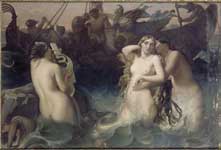
Odysseus and the Sirens, Victor Mottez

Ulysses and the Sirens, Thomas Moran

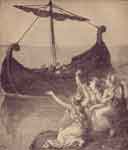
The Sirens imploring Ulysses to stay

Sirin, Ivan Bilibin.
Odysseus (Kirk Douglas) tied to the mast hears the songs of the Sirens, Ulysses 1955 film
The Suda (Byzantine Encyclopedia) on the Sirens
|
Places visited by Odysseus in Odyssey Ismaros - The island of Lotophagi - The island of Polyphemus - Aiolia - Telepylos - Aeaea The Underworld - The Sirens - (Scylla and Charybdis) - Thrinacia - Ogygia - Scheria - Ithaca |
See also : Greek Mythology. Paintings, Drawings
| Ancient Greece
Science, Technology , Medicine , Warfare, , Biographies , Life , Cities/Places/Maps , Arts , Literature , Philosophy ,Olympics, Mythology , History , Images Medieval Greece / Byzantine Empire Science, Technology, Arts, , Warfare , Literature, Biographies, Icons, History Modern Greece Cities, Islands, Regions, Fauna/Flora ,Biographies , History , Warfare, Science/Technology, Literature, Music , Arts , Film/Actors , Sport , Fashion --- |
Retrieved from "http://en.wikipedia.org"
All text is available under the terms of the GNU Free Documentation License


